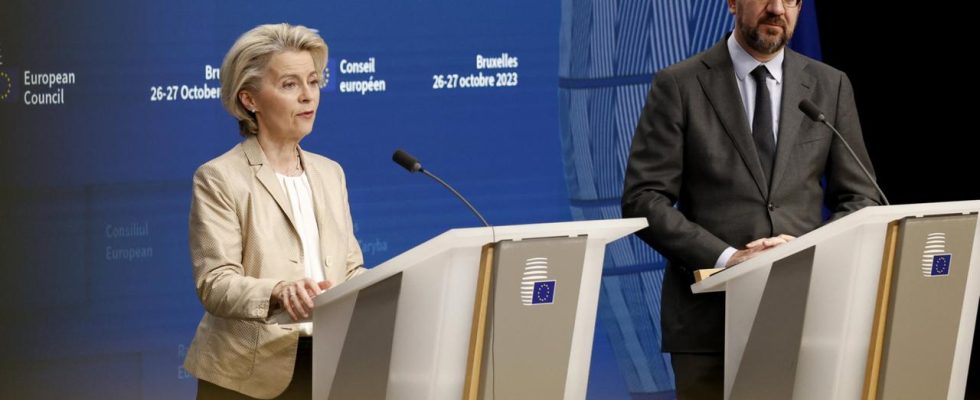The EU wants to stand firmly by Ukraine’s side even in the second winter of war. At the summit in Brussels, the states agreed on further military aid. However, a 50 billion aid package failed due to resistance from two members.
The EU has assured Ukraine of unwavering solidarity. In view of the impending second winter of war, the heads of state and government have promised the country further deliveries of arms and ammunition. They also promise the delivery of additional power generators and mobile heating stations as well as greater efforts to force Russia to participate in repairing war damage.
The European Union will provide decisive financial, economic, humanitarian, military and diplomatic assistance to Ukraine and its people for as long as necessary, said the adopted statement by the heads of state and government. Particular intensive work should therefore be carried out on the rapid provision of missiles and ammunition as well as anti-aircraft systems to protect the population and critical infrastructure.
Hungary and Slovakia against a billion-dollar package for Kiev
The countries were unable to agree on a new financial aid package worth 50 billion euros. Slovakia and Hungary opposed the proposal. The new Slovakian head of government Robert Fico called for guarantees against the misuse of the funds. According to diplomats, the Hungarian Prime Minister Viktor Orban also justified his rejection with an alleged lack of clarity as to whether the previous aid had been used wisely.
However, EU partners believe it is likely that Orban is actually interested in freeing more than 13 billion euros in frozen EU funding for his country.
EU Commission President Ursula von der Leyen proposed the package at the end of June as a reserve for Ukraine for the next four years. Of this, 17 billion euros are earmarked as direct grants from the EU budget and another 33 billion as loans. According to the head of the Commission, the member states would have to massively increase the budget financial framework that applies until 2027.
conversations too Security assurances
In addition to the 50 billion euro package, EU foreign policy chief Josep Borrell has brought into play longer-term financing commitments for military aid. He called on leaders to hold talks with Ukraine on such security commitments by the next summit in December. EU money could also be used to support the delivery of modern fighter jets and missiles, said Borrell. Specifically, he wants to mobilize five billion euros annually for military aid from 2024 to the end of 2027, which will come in addition to the proposed 50 billion euros in budget aid.
He is also considering promising the government in Kiev a significant expansion of the military training program for the Ukrainian armed forces. If circumstances permit, a gradual relocation of training activities to Ukraine could even be considered.
Russian money is intended to finance reconstruction
The reconstruction of Ukraine after the war was also a topic at the summit in Brussels. Proceeds from the management of frozen Russian assets should be used for reconstruction – to the extent possible in accordance with applicable treaty obligations and EU and international law.
The heads of state and government called on Borrell and the EU Commission to accelerate work on appropriate proposals for Russia’s compulsory participation.
Difficult negotiations lie ahead
Billions more are earmarked for the area of migration, as well as for dealing with natural disasters and expanding green technologies. In total, von der Leyen estimates additional funding at 66 billion euros by 2027. The European Parliament is even demanding an additional 76 billion euros from the member states.
Diplomats expect extremely difficult negotiations until December. Net contributors such as Germany, Sweden, Denmark and the Netherlands are pushing for funds that have already been promised to be redistributed before Brussels demands new money. At the beginning of the summit, Chancellor Olaf Scholz called for a “re-prioritisation of spending programs from the European budget”. On the other hand, countries such as Slovenia, Bulgaria and Estonia, like the EU Commission, are calling for the multi-annual financial framework to be increased.
Slovenia and other countries are demanding more money to deal with the high numbers of arriving migrants. Estonia also emphasized the need for increased military spending. Both topics that will not be decided on until the next EU summit at the earliest.
Tough struggle to explain the Middle East war
After tough discussions, the 27 heads of state and government agreed on a joint declaration on the war in the Middle East on Thursday evening. Among other things, they advocated “corridors and breaks for humanitarian purposes” to help civilians in the Gaza Strip.
Germany and Austria in particular had resisted calling on Israel for a ceasefire in order not to question the right to self-defense. A new EU aid flight took off today with more than 50 tons of medicines and other goods to the region. They are to be distributed from Egypt to those in need in the Gaza Strip, as the EU Commission announced. Five more flights are to follow.

